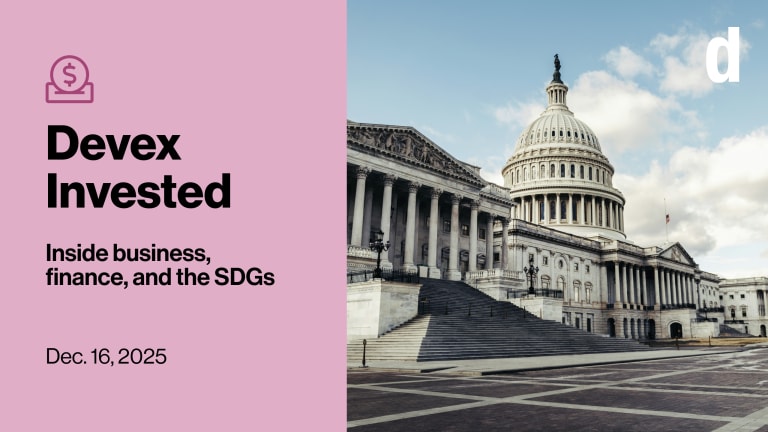Presented by Tech to the Rescue

Who would be a CEO, eh? U.S. International Development Finance Corporation CEO Scott Nathan was grilled by U.S. lawmakers from both sides (and on all fronts) last week.
DFC, which funds private sector development projects, is up for reauthorization next year, though lawmakers have signaled a desire to extend the agency’s mandate this year.
Rep. Mario Diaz-Balart, a Republican who leads the foreign affairs appropriations subcommittee, told Nathan that if DFC goes “too far down the Biden Administration’s woke agenda,” it will jeopardize the agency’s bipartisan support.
This is a preview of Devex Invested
Sign up to this weekly newsletter inside business, finance, and the SDGs, in your inbox every Tuesday.
Diaz-Balart warned that DFC investments, particularly in upper-middle-income countries, on things like gender equity, climate mitigation, adaptation, and resilience could be potential “land mines.”
“To many of us in the majority, some of these priorities sound more like ESG activism run amok than a focus on your core mission, which is to mobilize private capital in support of broad-based economic growth that furthers a foreign policy interest of the U.S.,” Diaz-Balart said.
Whereas Rep. Joaquin Castro, a Democrat from Texas, had a different kind of warning.
“I believe it is essential that we defend and strengthen the agency's development mandate,” he said. “I fear that if this agency simply becomes a bank to execute the foreign policy priorities of the United States, the bipartisan coalition that supports the DFC will splinter.”
Devex Senior Reporter Adva Saldinger followed the hearings for us and reported that Nathan outlined several steps lawmakers could take to improve the agency:
• Increasing the overall portfolio size from $60 billion to at least $100 billion.
• Expanding the number of countries where the agency can work.
• Addressing restrictions on certain investment tools, including equity.
• Growing the agency’s staff.
• Allowing it to use fees it receives to cover transaction costs.
Read: DFC chief faces congressional scrutiny on its 'woke agenda,' direction
Change is the only constant
It’s been on the cards since May 2021, when Bill Gates and Melinda French Gates announced their divorce. Now it’s official, with French Gates announcing this week that she will step down as co-chair of the Bill & Melinda Gates Foundation on June 7.
“This is a critical moment for women and girls in the U.S. and around the world — and those fighting to protect and advance equality are in urgent need of support,” French Gates wrote in a statement Monday. “Under the terms of my agreement with Bill, in leaving the foundation, I will have an additional $12.5 billion to commit to my work on behalf of women and families. I’ll be sharing more about what that will look like in the near future.”
Read more: Melinda French Gates resigns from Bill & Melinda Gates Foundation
Meanwhile, the Center for Global Development has announced its new president, with Rachel Glennerster to replace Masood Ahmed from Sept. 3.
A former chief economist at the U.K.’s Foreign, Commonwealth & Development Office and its predecessor, the Department for International Development, Glennerster is currently an associate professor of economics at the University of Chicago.
“Really great appointment,” one CGD staffer tells us. “She’s got the right combination of intellectual leadership, academic rigour and policy entrepreneurship to take CGD to the next level. Hopes are seriously high!”
Check out Glennerster’s recent co-authored essay on opportunities for mitigating greenhouse gas emissions in low- and middle-income countries.
+ For an in-depth reporting and analysis on global development top job moves and other insider information, read the Weekender, a Sunday newsletter exclusively for Devex Pro members.
Taxing times
Imagine a COP — or conference of the parties — for tax issues. That’s what campaigners are dreaming of as a new effort to bring international tax debates from the OECD to the United Nations gathers steam.
Your next job?
Director, Independent Evaluation Department
Islamic Development Bank
Saudi Arabia
As Devex’s Rob Merrick reports, at the end of last year a resolution to establish a convention to rework international tax procedures, tabled by Nigeria and championed by African countries, passed by 125 votes to 48. A 19-strong ad hoc committee will agree terms of reference for approval by the U.N. General Assembly later this year. Then the text of a treaty must be negotiated and ratified.
Much is at stake. According to the Tax Justice Network, 9% or $433 billion is diverted from the coffers of rich nations every year — while lower-income countries lose 49% of their public health funds as $47 billion of their receipts go up in smoke.
So far the ad hoc committee is looking at:
• Illicit financial flows — how to lift the veil of secrecy that enables tax-dodging through anonymous companies and undeclared assets, the laundering of criminal proceeds, and corruption such as the theft of state assets.
• Corporate taxation — whether to end the “arm’s length principle” that allows multinationals to declare intra-group profits in places where they will be taxed less.
• Cross-border services — to decide which country can tax and how, if, for example, a London law firm advises a company in a lower-income country.
Other issues could include how to tax the richest individuals, information exchange, dispute resolution, the digital economy, environmental and climate challenges, and tax incentives.
In short, one to watch.
Read: The global south loses $47B a year to tax abuse. That may soon change (Pro)
+ Not yet a Devex Pro member? Access all our exclusive reporting and analyses, data-driven funding insights, invite-only events, and the world’s largest global development job board by starting a 15-day free trial today.
What we’re reading
EU fighting to counter China’s influence in global south, says top official. [Financial Times]
How a debt-for-nature swap could be used for Rwanda’s parks. [Devex Opinion]
U.K. and New York laws have to be part of the global debt crisis fix. [Devex Opinion]








